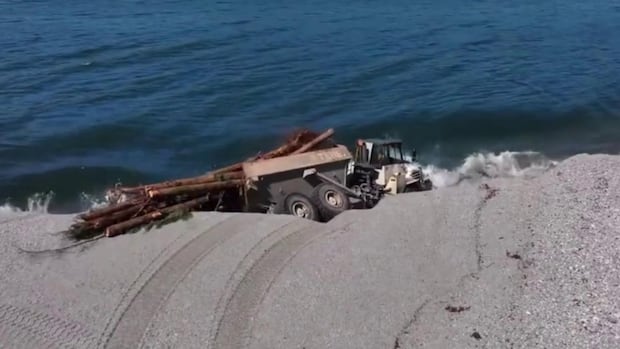A company based on central Vancouver Island has been reprimanded after its articulated rock truck and driver fell into Nitinaht Lake, about 100 kilometres northwest of Victoria — an incident that was captured in a stunning viral video posted on social media.
In a Facebook post, Port Alberni-based Roc-Star Enterprises says the incident occurred on Aug. 26, 2025, during a fish habitat restoration project.
The dramatic video shows a large truck carrying about a dozen logs operating near a shoreline. The vehicle drives parallel to the water and then drops into the lake as the ground gives way.
“Thankfully the experienced operator was also an experienced swimmer and was able to exit the vehicle and swim to safety without injury. He handled the situation remarkably well,” the company wrote.
“This event underscores the critical importance of continuous risk assessment in dynamic environments, particularly when working in or near water.”
As of Sept. 16, the video has nearly 300,000 views on Facebook.
The post says the company decided to share the video to “raise awareness and support safer practices industry wide.”
“The incident serves as a powerful reminder of the unpredictable nature of shoreline work and the need for ongoing vigilance, planning and safety training across all levels of heavy industry,” the post says.
CBC News has reached out to the company several times for comment over the last few weeks.
In an email sent Aug. 30, owner Bill Coates confirmed the video is authentic and has not been altered by AI — as many people commenting on the post seemed to believe.
Coates said the incident is under investigation and it would be inappropriate for him to comment further.
WorkSafeBC report
Several people have posted comments on the video, questioning the company’s safety standards.
WorkSafeBC confirmed it was investigating the incident. The provincially legislated workplace safety organization shared a report, redacted for privacy, dated Sept. 5, 2025.
The report says Roc-Star enterprises is a business that primarily builds and maintains roads and bridges on resource roads.
“This employer had a articulating rock truck operating on a beach that could not support the weight of the truck,” the report says. “The soil became liquefied and the truck became unstable and rolled into the lake.”
WorkSafeBC says the incident contravened Occupational Health and Safety Regulation Section 4.1, which is that a workplace must be “planned, constructed, used and maintained to protect from danger any person working at the workplace.”
It has ordered Roc-Star Enterprises to prepare a notice of compliance report by Sept. 25, 2025.
Challenging environment
Enda Murphy, an assistant professor in Coastal Engineering at the University of British Columbia, says working in coastal environments can be really challenging.
Murphy is not familiar with the details of this particular project, but he told CBC News that operating heavy machinery in steep foreshore situations would normally be avoided.
“Sediments that have been moved relatively recently by things like waves and currents … are not as stable inherently. They’re quite loosely packed, and because they’re on the coast, of course there’s high moisture content or saturation,” he said.
“Heavily loading them like we saw in that video can can lead to instability, and in that case, I guess complete slope failure.”
Assessing a marine work environment is often an interdisciplinary problem, Murphy says, that would often involve geotechnical engineers. He added that no workplace environment is ever completely safe, and natural environments often have hazards that can affect workplace safety.
It’s not clear what precautions, if any, Roc-Star Enterprises had taken in this situation.







